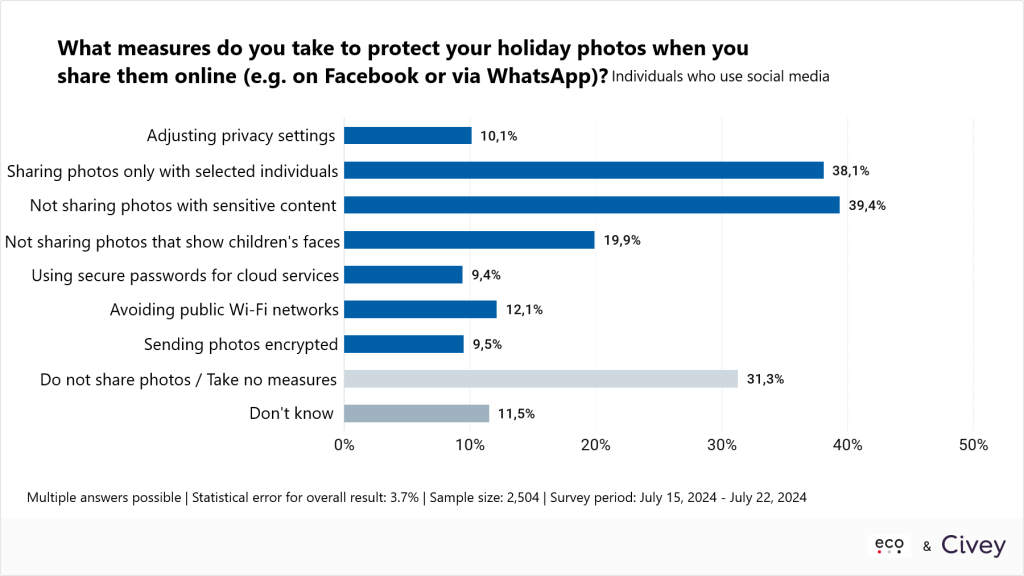- One third of Germans (31.3%) do not take any precautions when sharing holiday photos
- Those who do take precautions avoid sharing pictures with sensitive content (39.4%), only share pictures with a selected group of people (38.1%) or refrain from posting pictures that show children’s faces (19.9%)
- eco provides 5 tips on how to protect your children when sharing holiday photos
Summer, sun, beach. The holiday season offers great photo opportunities that many Germans like to share with their friends and families online: a joint trip to the sea, children building a sandcastle, or splashing around in the cool water. These seem like harmless photos, but they can cause big problems if they are not adequately protected when shared via messenger services and social media platforms.
A representative survey* commissioned by eco – Association of the Internet Industry reveals that a third of those surveyed (31.3%) do not take any measures to ensure that their holiday photos are as secure as possible online. And this is despite the long-known dangers of carelessly sharing photos of children online.
However, it is not that difficult to take precautions that help to protect your own pictures, says Alexandra Koch-Skiba, Head of the eco Complaints Office. It is important to check the pictures before sharing them, especially if children are visible in them. “It is completely understandable that parents like to capture special moments on holiday, take photos of their children, and then share them with others,” says Koch-Skiba. “But what truly matters is the content of the pictures and with whom or on which platforms they are shared.”
The eco survey shows that there is increasing awareness about what is shared online, where, and with whom. For example, 39.4% of Germans do not share pictures with sensitive content. 38.1% of those surveyed only share their holiday photos with selected people, while 19.9 % do not share any pictures showing children’s faces.
However, since it is not enough to take just one of the above mentioned measures, Koch-Skiba gives five tips on how parents can protect their children when sending or sharing pictures online during the holiday season or at any other time of the year:
1. Do not share pictures that show too much skin
In general, the lawyer recommends refraining from sharing photos in which children and young people are naked or lightly clothed. This also includes photos in swimwear. Although it is understandable that parents want to capture their trip to the sea or the swimming pool, Koch-Skiba warns that family photos can fall into the wrong hands and be sexualised: “It’s always important to keep in mind that recipient might take screenshots of postings or a status, which could then be further circulated without the parents even knowing about it.”
2. Avoid showing the faces of young people
The Head of the eco Complaints Office also cautions users to be careful with supposedly harmless photos. “Even photos taken when visiting tourist attractions, at the playground or at a child’s birthday party can sometimes end up in paedophile forums if shared and posted carelessly and taken out of context,” warns Koch-Skiba. Although this may not be the norm, parents should be aware of the potential risks. The general rule is covering your children’s faces with a smiley, pixelating them, or just photographing them from behind. This is not only safer, but also protects their privacy rights.
3. Involve children and educate them
If possible, parents should involve their children in deciding with whom they want to share the photos. “Of course, this only works if the children are a little older,” says Koch-Skiba. “However, introducing your children to this topic at an early age also lays the foundation for their responsible social media use during their teenage years.” The eco Complaints Office is also involved in prevention, for example in the form of regular workshops at schools and parents’ evenings.
4. Check security settings
Koch-Skiba also recommends sharing photos only with selected individuals, such as relatives or close friends. To achieve this, popular messenger services and social media platforms provide comprehensive security settings that go beyond the simple choice of a private or public account. “For instance, if I wish to share holiday pictures on my status – temporarily and for up to 24 hours – I now have the option to decide for each individual contact whether the photos should be visible to them or not,” explains Koch-Skiba.
5. Report inappropriate photos
If you have any concerns about your posts, you should consider deleting it. This is the least you can do to minimise the risks. The same applies to the use of messenger and social media services by adolescents on their own mobile phones. Inappropriate photos of children and young people can also be reported to the eco Complaints Office.
*On behalf of eco, the market and opinion research institute Civey surveyed around 2,504 adult German citizens between 15 and 22 July 2024. The results are representative. The statistical error of the overall results is 3.7 per cent.





